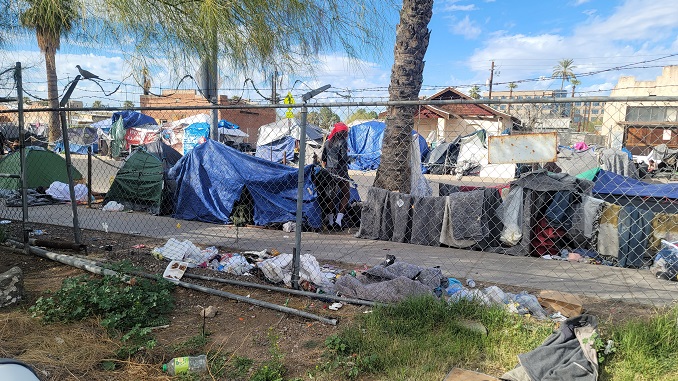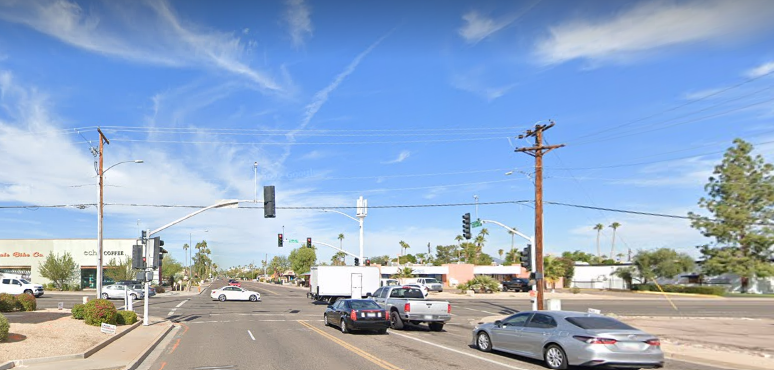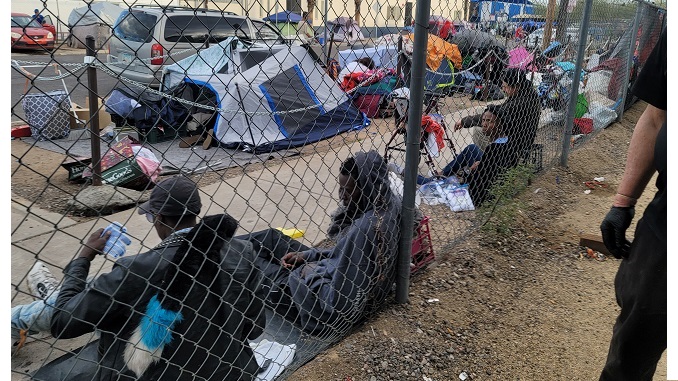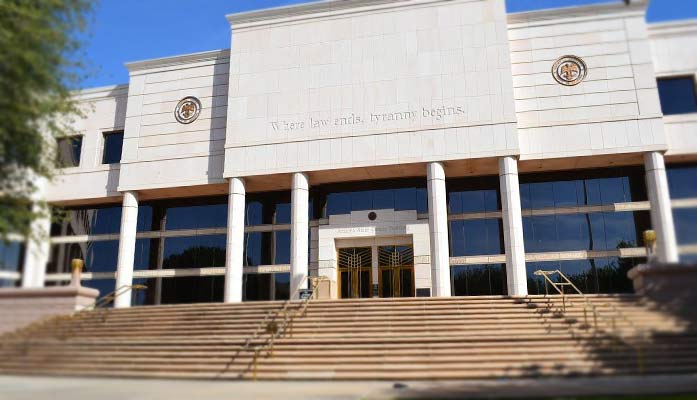
by Corinne Murdock | Mar 28, 2023 | News
By Corinne Murdock |
On Monday, the Maricopa County Superior Court ruled that the city of Phoenix is at fault for the homeless crisis, most evident in the massive encampment downtown known as “The Zone.”
Judge Scott Blaney ruled that city officials had done nothing to improve The Zone, declaring it a public nuisance. Rather, Blaney declared that the city had created and maintained The Zone. Blaney added that the actions undertaken by the city, allegedly to address the homeless crisis, had served only to grow its bureaucracy and throw money into government and nonprofit programs that haven’t yielded any discernible results.
“With few exceptions, the action items about which city representatives testified centered around the creation of more bureaucracy, additional staff positions, and obtaining additional funding for programs to vaguely address homelessness in general,” stated Blaney. “The Court received very little evidence — if any — that the City intends to take immediate, meaningful action to protect its constituent business owners, their employees, and residents from the lawlessness and chaos in the Zone.”
Blaney ordered the city to abate The Zone by permanently removing the encampments in public rights of way; cleaning up the biohazardous materials including human feces and urine, drug paraphernalia, and other trash; and removing individuals committing offenses against the public order. Effectively, the judge ordered the city to enforce existing laws.
The city has until July 10 to achieve material results toward compliance with the court’s ruling.
In the 23-page ruling, Blaney agreed with arguments posed by the plaintiffs, made up of residents and business owners in The Zone: that the city stopped enforcing laws within The Zone, resulting in increased violent crime, property crime, prostitution, public indecency, public drug use, a blocks-long biohazard, fire hazards, and environmental destruction.
READ OUR INVESTIGATIVE REPORT ON THE ZONE
Notably, Blaney agreed that the owners of Maker Kitchens had the right to install the dinosaur statues on the right of way adjacent to its building to discourage the homeless from re-establishing their encampments after the city did a cleanup to do gas line work. Blaney ruled that the city had arbitrarily enforced its laws so as to ignore violations by the homeless on that land and yet demand removal of the statues.
Blaney ruled that the city couldn’t force the restaurant to remove the dinosaur statues until it cleaned up The Zone or the court issued a further order.
Blaney ruled that the city had “abused its discretion through the arbitrary application of the law and provision of taxpayer funded security in The Zone.” He also ruled that the residents and business owners who filed the lawsuit had a strong possibility of receiving damages on the basis of irreparable injury, should the city not provide relief by mitigating The Zone.
Blaney agreed that city leaders erroneously applied the Ninth Circuit Court of Appeals’ ruling in Martin v. City of Boise, which determined that municipalities couldn’t enforce public camping laws against the homeless when no adequate temporary shelter options existed.
The judge further noted that the city had wholly ignored the residents’ and business owners’ proposals to resolve the homeless crisis, an outdoor shelter space, presented in January 2020 — just before the crisis “really got out of hand.” However, the city ignored all proposed plans to mitigate the crisis until one month before the plaintiffs filed their lawsuit, last October. That’s when the city approved the construction of a “sprung structure” containing 200 additional shelter beds.
Yet, Blaney stated that the city’s proposed shelter options were either designed as temporary, being seasonal, or as speciality situations, being intended for domestic violence survivors or COVID-19 response.
At one point in his ruling, Blaney surmised that violent, organized crime had taken root in The Zone. AZ Free News reported that gangs run The Zone, assaulting and charging encampment space rent to the homeless.
“The evidence also strongly suggests that the City created and maintained the dire situation that currently exists in The Zone through its failure, and in some cases refusal, to enforce criminal and quality of life laws in The Zone,” said Blaney. “The City’s refusal to meaningfully enforce statutes and ordinances in The Zone has created a classic ‘siren song’ to certain individuals that are enticed at their peril by The Zone’s drugs, sex, and lack of societal rules.”
The court’s ruling comes days after the city promised it would arrange some kind of meeting on the issue at some point following back-to-back murders in The Zone.
Corinne Murdock is a reporter for AZ Free News. Follow her latest on Twitter, or email tips to corinne@azfreenews.com.

by Corinne Murdock | Mar 27, 2023 | Education, News
By Corinne Murdock |
Arizona State University (ASU) held a Department of Justice (DOJ) “United Against Hate” event for the LGBTQ+ community last Wednesday.
The event was the second in a series from the Arizona District Attorney’s Office, hosted by ASU’s Sandra Day O’Connor College of Law. There were approximately 80 guests invited, including representatives from the FBI, the Phoenix Police Department, the Maricopa County Attorney’s Office, and the Attorney General’s office.
District attorney Gary Restaino said that his office was not only committed to prosecuting hate crimes and discrimination, but tackling ignorance and bias.
“Hate crimes harm not just individuals, but also traumatize communities and families,” said Restaino. “My office is committed to using all the tools in our law enforcement arsenal, both to prosecute acts motivated by hate, and to educate against ignorance and bias.”
UAH events are part of the DOJ’s national United Against Hate program, which coordinates all 94 U.S. Attorney’s Offices (USAOs) to combat hate crimes. The DOJ announced the initiative last September. According to the initial press release description of the program, UAH events resemble workplace harassment training: hypothetical scenarios and video clips depicting real-life hate crime cases and stories.
Attorney General Merrick Garland explained that the UAH program was designed to strengthen coordination between the community and law enforcement to respond to hate crimes and discrimination.
“That is why the Justice Department has launched its new United Against Hate program. This initiative brings together community groups, community leaders, and law enforcement at every level to build trust and strengthen coordination to combat unlawful acts of hate,” said Garland.
Assistant Attorney General Kristen Clarke added that this greater coordination would ensure that more allegations of hate crimes and discrimination would be investigated.
“The stronger the ties between communities and law enforcement, the more faith that communities will have that their allegations will be investigated and taken seriously. This moment requires an all-hands-on-deck strategy to fully confront unlawful acts of hate,” said Clarke. “The United Against Hate program brings together the vast network of civil rights, government, faith, and community-based leaders needed to improve reporting, promote prevention strategies and build the resilience needed to confront hate crimes and incidents.”
Garland first revealed the intent to launch the UAH initiative in May 2021, following President Joe Biden signing the COVID-19 Hate Crimes Act and Jabara-Heyer NO HATE Act into law. The act prioritizes funding for states who implement a hate crimes investigatory infrastructure in accordance with the legislation, part of which includes a community liaison and public meetings or educational forums on the impact of hate crimes, services available to hate crime victims, and the laws regarding hate crimes.
The act also moved that those sentenced to supervised release following imprisonment for a hate crime may be required to undergo educational classes or community service related to their offense.
Three USAOs piloted the program in spring 2021: New Jersey, Massachusetts, and the Eastern District of Washington. There have been over 50 events held nationwide since then.
The first UAH event in Arizona occurred in December, at the First Institutional Baptist Church in Phoenix. The event focused on combating hate crimes and discrimination against African-Americans. The Arizona District Attorney’s Office plans on hosting more UAH events in the coming months.
Corinne Murdock is a reporter for AZ Free News. Follow her latest on Twitter, or email tips to corinne@azfreenews.com.

by Corinne Murdock | Mar 26, 2023 | News
By Corinne Murdock |
Scottsdale will halve the number of lanes on a major roadway, a “road diet” that effectively burdens car travel. The changes will occur to 68th Street between Indian School Road and Thomas Road, and will reduce the two-lane roads on either side into single lanes.
According to the Department of Transportation (DOT), a “road diet” occurs when a four-lane undivided roadway becomes a two-lane undivided roadway, with the former road lanes converted into alternative transportation lanes: bike lanes or pedestrian refuge islands, for example.
DOT noted that road diets are typically implemented on roadways with current and future average daily traffic of 25,000 or less. According to the city data last updated in 2020, the average daily traffic counts for that area were 38,000 at the crossroads of 68th Street and Thomas Road, and 46,100 at 68th Street and Indian School Road. That number is undoubtedly higher now based on the latest population data.
According to census estimates, Scottsdale is growing at a rate of about one percent annually, and has grown by nearly three percent since the 2020 census. According to the U.S. Census annual state population estimates released last December, the state was the fifth-fastest growing state in the nation; Maricopa County leads in those gains.
The city approved the changes during its council meeting last week in a close vote, 4-3. The two lost lanes will be turned into bike lanes using a .2 percent transportation sales tax funding, costing just over $334,600. The city will also receive over $1.48 million in federal funding awarding environmentalist development: “Congestion Mitigation Air Quality” and “Transportation Alternatives” funds.
With federal and local funds combined, current funding sources for the project total $1.8 million. Proposed funding for the project total over $1.9 million.
Councilmember Barry Graham lamented his fellow council members’ decision.
“I tried to find a compromise that preserved the car lanes,” tweeted Graham. “Unfortunately, councilmembers made the issue about what they want—not what you want.”
Vice Mayor Kathy Littlefield and Councilmembers Betty Janik joined Graham in his “no” vote.
State Rep. Joseph Chaplik (R-LD03) criticized Scottsdale for adopting a “road diet.”
Chaplik also testified that he bore witness to similar initiatives taking place in Portland, Oregon, before that city “imploded.”
The reduction of car lanes to disincentivize car use echoes similar “Vision Zero” efforts — an attempt to eliminate all traffic fatalities by restructuring roads in ways that, ultimately, diminish the number of cars on the road. Vision Zero is a fiscally sponsored project of Community Initiatives, a grantmaking institution whose funding comes from a variety of left-leaning nonprofits such as the Grove Foundation, Rockefeller Brothers Fund, and the NoVo Foundation.
Scottsdale’s major neighbor, Phoenix, adopted a Vision Zero plan of their own.
Last September, the city of Phoenix decided to spend $10 million every year until they achieve zero traffic-related fatalities, as per their Vision Zero Road Safety Action Plan (RSAP).
Corinne Murdock is a reporter for AZ Free News. Follow her latest on Twitter, or email tips to corinne@azfreenews.com.

by Corinne Murdock | Mar 25, 2023 | News
By Corinne Murdock |
Following the latest two homicides to occur in The Zone, downtown Phoenix’s notorious homeless encampment, city leaders say they plan to convene to take action. There were no further details offered of when or where this meeting will occur; the next policy session, scheduled for April 11, was canceled.
A city spokesperson told AZ Family that these latest violent acts prompted their pending meeting.
“Our urgent priority is helping connect unsheltered individuals around [the] Human Services Campus with safe, indoor housing options and resources to end homelessness,” stated the spokesperson.
The spokesperson also noted that the city added nearly 600 new shelter beds last year, and projected that 800 will be available through this year. There are over 1,000 estimated homeless individuals in The Zone.
The first victim of the latest murders, a man, was discovered around 8 am on Tuesday. Police told Fox 10 Phoenix that they were unable to identify the victim due to the burn injuries. Two men were arrested as suspects in the crime: 18-year-old Isaiah Baskin, and 22-year-old Larry Scott.
Baskin alleged that he played a role in the crime: he allegedly witnessed Scott and another, unidentified individual assault the victim, then assisted them in bagging, transporting, and dumping the victim into a dumpster. Baskin reportedly told police that he could hear the victim moaning inside the dumpster. Then, Baskin admitted that he retrieved a lighter which Scott used to set the victim on fire.
Around 48 hours after the first victim’s death, the second victim of the latest murders, a woman, was shot. Officers responded to a call from a man alleging that someone hit him in the head with a gun before shooting the woman. The woman later died due to her injuries at a hospital. A suspect has yet to be named.
Vice Mayor Yassamin Ansari, whose district encompasses The Zone, didn’t issue a public statement on the two murders. However, she did share a New York Times article highlighting the plights of several homeless and business owners in the area.
There were over 700 homeless deaths in the area last year — an uptick of several hundred from 2021.
Per AZ Free News reporting on The Zone, the incessant daily crime has reached levels unmanageable by police. First responders have assessed the area as too dangerous to enter without police escort. Gangs run the streets, making the homeless pay for tent space and assaulting them as punishment.
Not all leadership appeared to be as fazed by the state of The Zone.
Secretary of State Adrian Fontes, hours after the initial murder — a man burned alive in a dumpster — called the area “not great” and suggested that constituents “go buy a sandwich” from a restaurant located within The Zone.
Comparatively, attorney general candidate Abe Hamadeh compared Phoenix to Gotham: the fictional, crime-ridden city of Batman lore.
Corinne Murdock is a reporter for AZ Free News. Follow her latest on Twitter, or email tips to corinne@azfreenews.com.

by Corinne Murdock | Mar 23, 2023 | News
By Corinne Murdock |
On Wednesday, the Arizona Supreme Court granted a review to gubernatorial candidate Kari Lake in her challenge of the 2022 election’s validity.
The court dismissed six of the seven issues presented by Lake. The one granted review concerned Maricopa County’s signature verification policies. Chief Justice Robert Brutinel determined that the trial court had wrongly dismissed this issue by interpreting it as a challenge to the policies themselves rather than the application of the policies.
The issue asks:
“Did the panel err in dismissing the signature-verification claim on laches, mischaracterizing Lake’s claim as a challenge to existing signature verification policies, when Lake in fact alleged that Maricopa failed to follow these policies during the 2022 general election?”
Lake alleged that Maricopa County violated A.R.S. § 16-550(A), claiming that a material number of early ballots cast in the election were transmitted in envelopes containing an affidavit signature that election officials accepted despite determining that it didn’t match the signature on that voter’s registration record.
In a press release, Lake characterized the ruling as a win. She called Maricopa County’s signature verification system “completely broken,” and claimed the county was “absolutely terrified” of transparency.
Court watchers say the court has remanded the signature verification issue to the trial court to reconsider the motion to dismiss on grounds other than laches. If the court determines there are no legally sufficient grounds to dismiss, then the court must hold a trial to review the relevant evidence to determine if an outcome determinative number of early ballots were accepted without appropriate signature verification.
While this ruling offers Lake the opportunity to review the signature process, it likely won’t change the outcome of the trial based on the lead in votes by Gov. Katie Hobbs: over 17,100. On the other hand, the court’s signal that it would allow a trial may be favorable for attorney general candidate Abe Hamdeh.
Hamadeh is recorded as losing the election to Democratic opponent, Attorney General Kris Mayes, by just under 300 votes.
Hamadeh appealed the election after the recount discovered that Pinal County undercounted hundreds of ballots, halving Mayes’ original lead from over 511 to under 300.
Mass failures of election machines on Election Day, specifically stemming from the printers, caused long waiting times at vote centers and, in some instances, caused voters to either be discouraged from voting or unable to vote due to time constraints. Those who did stay and were unable to cast a regular ballot due to tabulator issues were forced to cast provisional ballots. Over 17,000 voters filed provisional ballots.
Corinne Murdock is a reporter for AZ Free News. Follow her latest on Twitter, or email tips to corinne@azfreenews.com.





